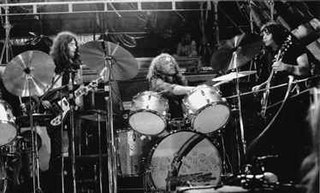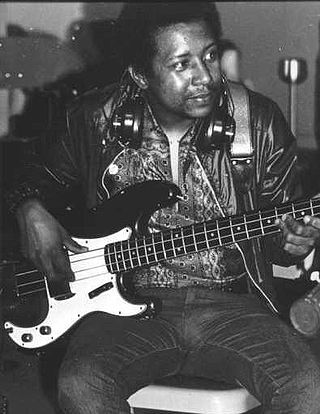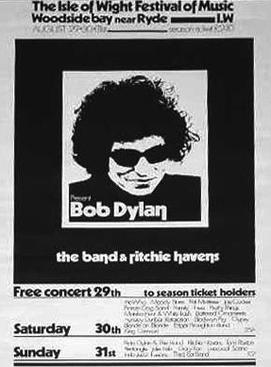
Pretty Things were an English rock band formed in September 1963 in Sidcup, Kent, taking their name from Bo Diddley's 1955 song "Pretty Thing", and active in their first incarnation until 1971. They released five studio albums, including the debut The Pretty Things and S. F. Sorrow, four EPs and 15 UK singles, including the Top 20 UK Singles Chart "Don't Bring Me Down" and "Honey I Need". They reformed later in 1971 and continued through to 1976 issuing three more studio albums, and reformed once again from 1979 to 2020 releasing another five studio albums finalising with Bare as Bone, Bright as Blood.

The Isle of Wight Festival 1970 was a music festival held between 26 and 30 August 1970 at Afton Down, an area on the western side of the Isle of Wight in England. It was the last of three consecutive music festivals to take place on the island between 1968 and 1970 and often acknowledged as the largest musical event of its time, with a larger attendance than Woodstock. Although estimates vary, Guinness World Records estimated 600,000 to 700,000 people attended. It was organised and promoted by local brothers, Ron and Ray Foulk through their company Fiery Creations Ltd and their brother Bill Foulk. Ron Smith was site manager and Rikki Farr acted as compere.

The Isle of Wight Festival is a British music festival which takes place annually in Newport on the Isle of Wight, England. It was originally a counterculture event held from 1968 to 1970.

The Australian Pink Floyd Show, more frequently referred to as the Australian Pink Floyd, is a Pink Floyd tribute band formed in 1988 in Adelaide, South Australia. Their live shows attempt to recreate the look, feel, and sound of Pink Floyd's later world tours, employing visual aids such as lasers, inflatables and a large display panel similar to Mr Screen. The Australian Pink Floyd Show plays venues worldwide.

Phun City was a rock festival held at Ecclesden Common near Worthing, England, from 24 July to 26 July 1970. Excluding the one-day free concerts in London's Hyde Park, Phun City became the first large-scale free festival in the UK.

The British counter-culture or underground scene developed during the mid-1960s, and was linked to the hippie subculture of the United States. Its primary focus was around Ladbroke Grove and Notting Hill in London. It generated its own magazines and newspapers, bands, clubs and alternative lifestyle, associated with cannabis and LSD use and a strong socio-political revolutionary agenda to create an alternative society.

Pink Fairies are an English proto-punk rock band initially active in the London underground and psychedelic scene of the early 1970s. They promoted free music, drug use, and anarchy, and often performed impromptu gigs and other stunts, such as playing for nothing outside the gates at the Bath and Isle of Wight pop festivals in 1970, as well as appearing at Phun City, the first Glastonbury and many other free festivals including Windsor and Trentishoe.
John Charles Edward Alder, also known as Twink, is an English drummer, actor, singer, and songwriter who was a central figure in the English psychedelic and proto-punk movement.

The Deviants were a British psychedelic rock band originally active from late 1966 to 1969, but later used as a vehicle for the musical work of writer Mick Farren until his death in 2013.

William Cox is an American bassist, best known for performing with Jimi Hendrix. Cox is the only surviving musician to have regularly played with Hendrix: first when both were in the Army, then in 1969 with the experimental group that backed Hendrix at Woodstock, followed by the trio with drummer Buddy Miles that recorded the live Band of Gypsys album, and, lastly, The Cry of Love Tour trio with Mitch Mitchell back on drums. Cox continues to perform dates with the Band of Gypsys Experience and the Experience Hendrix Tour.

Blue Wild Angel: Live at the Isle of Wight is a posthumous live album by Jimi Hendrix released on November 12, 2002. The album documents Hendrix's last U.K. live performance at the Isle of Wight Festival on August 31, 1970, three weeks before his death. The set list for the concert contained songs from the original Experience albums, as well as new songs. Some were previously available on Isle of Wight (1971) and Live Isle of Wight '70 (1991). "Power to Love ", "Midnight Lightning", and "Foxy Lady" released in the US on the three record set The First Great Rock Festivals of the 70s: Isle of Wight/Atlanta Pop Festival" released on Columbia Records in 1971.

Message to Love is a feature documentary film of the Isle of Wight Festival 1970. Directed and produced by Murray Lerner, the film includes performances by popular rock acts, such as Jimi Hendrix, the Who, and the Doors, as well as folk and jazz artists, such as Joni Mitchell and Miles Davis. The title of the film is taken from a song by Hendrix.

The Bath Festival of Blues and Progressive Music was a counterculture era music festival held at the Royal Bath and West Showground in Shepton Mallet, Somerset, England on 27–29 June 1970. Bands such as Pink Floyd and Led Zeppelin performed, and the festival was widely bootlegged. An 'alternative festival' was staged in an adjoining field where the Pink Fairies and Hawkwind played on the back of a flatbed lorry.

Glastonbury Fayre is a triple album released in 1972, comprising performances by acts who had appeared at the Glastonbury Festival in 1971 and others. The album came in a fold-out poster sleeve inside a printed PVC outer sleeve, with a 32-page illustrated booklet, a poster sheet and a fold-out Silver Pyramid, all designed by Barney Bubbles.
The Gun were a late 1960s British rock guitar trio who had a single British Top Ten hit, "Race with the Devil" and recorded two albums before disbanding. The band included brothers Paul Gurvitz and Adrian Gurvitz.

The 1969 Isle of Wight Festival was held on 29–31 August 1969 at Wootton Creek, on the Isle of Wight. The festival attracted an audience of approximately 150,000 to see acts including Bob Dylan, the Band, the Who, Free, Joe Cocker, the Bonzo Dog Band and the Moody Blues. It was the second of three music festivals held on the island from 1968 to 1970. Organised by Rikki Farr, Ronnie and Ray Foulk's Fiery Creations, it became a legendary event, largely owing to the participation of Dylan, who had spent the previous three years in semi-retirement. The event was well managed, in comparison to the recent Woodstock Festival, and trouble-free.
Wally is a British English expression referring to a "silly or inept person", which later developed into an umbrella term for "vulnerable individuals".
The Aachen Open Air Pop Festival was a rock festival held at Hauptstadion in Aachen, West Germany, on 10–12 July 1970. The "Soersfestival", as it is commonly called, was the initiative of three local students: Golo Goldschmitt, Walter Reiff, and Karl-August Hohmann in particular. As there were many hippies and freaks to be expected from all over Europe, the organisers had to tackle considerable difficulties and hostilities to crack on with the idea. Between 30,000 to 40,000 visitors attended. The Festival was well-organised, the weather was fine and no real problems occurred in spite of a massive and intimidating cop presence. Coca-Cola was the main investor, along with some local entrepreneurs. Tickets cost DM 15,-, or DM 40,- for three days. Artists who ultimately declined invitations, included Ginger Baker's Air Force, Canned Heat, Donovan, Fat Mattress, John Lennon & the Plastic Ono Band, John Mayall, Rhinoceros, The Rolling Stones and Soft Machine.

Live at the Isle of Wight Festival 1970 is a live album by the American rock band the Doors, released on February 23, 2018, on Rhino Records. The concert was recorded at the Isle of Wight Festival in England on August 30, 1970, and this was released by Eagle Rock Entertainment. It was the group's final appearance as a foursome outside of the US and also the last full filming of a Doors concert.















